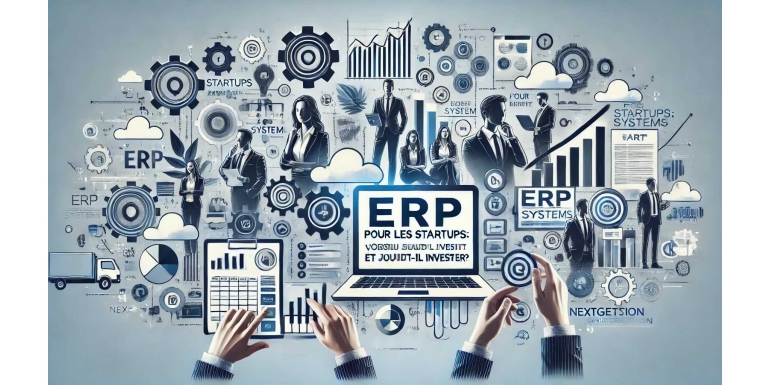
ERP for Startups: Why and When Should You Invest?
In the dynamic world of startups, where every decision can significantly impact the company's growth, choosing the right time to invest in an Enterprise Resource Planning (ERP) system is crucial. ERPs, traditionally associated with large enterprises, offer considerable advantages even for growing startups. This article explores why a startup should consider investing in an ERP, the signs indicating the right time to do so, and how an ERP can support the company’s growth and scalability.
1. What is an ERP and Why is it Important for a Startup?
An ERP (Enterprise Resource Planning) is an integrated software system that centralizes the management of various business functions, such as accounting, human resources, inventory management, sales, and production. For startups, an ERP might seem like a significant investment, but it can quickly become an essential lever for growth.
-
Data Centralization: An ERP centralizes all operational data into a single system, providing better visibility into the company’s performance and enabling more informed decision-making.
-
Process Automation: By automating repetitive and time-consuming tasks, an ERP allows the team to focus on strategic activities, thereby improving productivity.
-
Improved Collaboration: By integrating different business functions, an ERP facilitates collaboration among teams, reducing information silos and optimizing internal communication.
2. The Benefits of an ERP for Startups
Investing in an ERP can offer several strategic advantages for a startup, particularly in terms of efficient management, growth, and scalability.
-
Operational Efficiency: An ERP streamlines operations by unifying processes and reducing errors, resulting in increased efficiency and cost savings.
-
Visibility and Transparency: An ERP provides a real-time overview of business operations, allowing founders and managers to monitor key performance indicators and respond quickly to challenges.
-
Scalability: As the startup grows, an ERP accommodates growth without needing to reinvent processes, making it easier to expand into new markets or add new product lines.
-
Compliance and Risk Management: An ERP helps ensure regulatory compliance by automating data collection and generating accurate reports, reducing the risk of non-compliance.
3. When Should You Invest in an ERP?
While the benefits of an ERP are clear, the right time to invest can vary from one startup to another. Here are some signs that it’s time to consider adopting an ERP.
-
Increasing Operational Complexity: If your startup is beginning to manage more complex processes, such as handling multiple warehouses, international supply chains, or rapidly growing sales volumes, an ERP can help manage this complexity.
-
Information Silos: When different teams in your startup use disparate systems that don’t communicate well with each other, it can lead to inefficiencies. An ERP centralizes information, eliminating silos and improving collaboration.
-
Rapid Growth: If your startup is experiencing rapid growth and manual processes are struggling to keep up, an ERP can automate these processes and support continued growth.
-
Inventory Management Challenges: If you are having difficulty tracking inventory levels, managing orders, or avoiding stockouts, an ERP can provide a more efficient and accurate inventory management solution.
-
Increased Reporting Needs: If you need more sophisticated financial or operational reports for investors, lenders, or regulators, an ERP can generate detailed real-time reports, ensuring transparency and compliance.
4. How to Choose the Right ERP for a Startup?
Choosing the right ERP for your startup is a strategic decision that requires careful consideration. Here are some criteria to consider when making your selection.
-
Modularity and Flexibility: Opt for a modular ERP that allows you to start with basic functionalities and add modules as your business grows.
-
Cost and ROI: Assess the total cost of ownership, including licensing, implementation, and training fees. Ensure that the chosen ERP offers an adequate return on investment (ROI).
-
Ease of Use: A complex ERP can lead to additional training and adaptation costs. Choose a user-friendly solution that integrates easily into your startup's daily operations.
-
Scalability: Ensure that the ERP can grow with your business, easily integrating new features or adapting to rapid growth.
-
Support and Training: Check that the ERP provider offers strong technical support and training options to help your team get the most out of the system.
5. Case Studies: Startups that Succeeded with an ERP
Many startups have successfully accelerated their growth by adopting an ERP in the early stages of their development. For example, an e-commerce startup was able to automate its inventory management and improve customer service with an ERP, leading to a 40% increase in sales within a year.
Similarly, a rapidly expanding tech startup used an ERP to centralize its operations and streamline its product development processes, reducing its time-to-market by 30%.
Conclusion: ERP, a Strategic Investment for Startups
Investing in an ERP may seem like an ambitious step for a startup, but the long-term benefits can far outweigh the initial costs. A well-chosen and properly implemented ERP can transform the way your startup operates, equipping it with the tools needed to manage complexity, grow efficiently, and remain competitive in an ever-evolving market. The ideal time to invest in an ERP will depend on your startup's size, complexity, and goals, but one thing is certain: an ERP can be a catalyst for long-term success.
